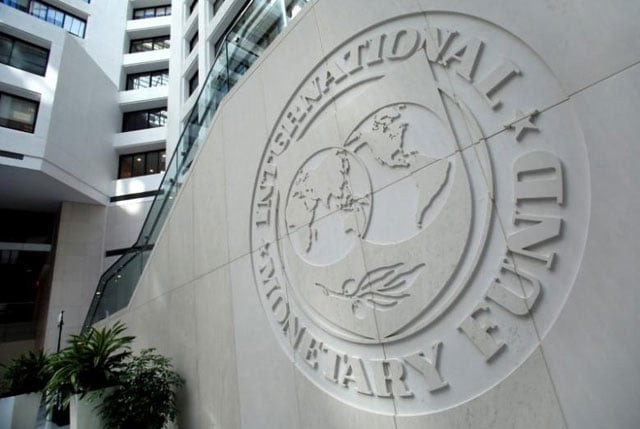Irked by PM’s absence, new IMF director cancels visit to Pakistan
Postponement not to have implications for ongoing talks, says IMF official

PHOTO: Reuters
Azour was scheduled to join the post-programme monitoring talks currently going on between the IMF authorities and Pakistani officials to find solutions to the problems of the external sector and chronic circular debt, said sources in the Ministry of Finance.
Apart from meeting Premier Abbasi, Azour was also scheduled to meet Punjab Chief Minister Shehbaz Sharif, but now both these meetings had been cancelled, they added.
The talks that began on December 5 would now conclude before the scheduled date of December 14, said the sources, adding that Azour was scheduled to join the policy dialogue from Monday.
IMF wants safeguards against reckless borrowing, unchecked expenditures
“The visit of Azour has been postponed,” confirmed IMF’s Resident Representative in Islamabad Tokhir Mirzoev, adding that the postponement of the visit would not have any implications for the ongoing talks.
“The IMF’s director postponed his visit to Pakistan due to non-availability of PM Abbasi, who is leaving for Turkey to attend an emergency meeting of the Organisation of Islamic Countries,” verified Special Assistant to Prime Minister on Economic Affairs Miftah Ismail.
However, Ismail said that Azour would visit Pakistan in the future.
Azour had assumed the responsibilities of IMF director for Middle East and Central Asia in March this year. He replaced Pakistani-born Masood Ahmed who left the fund in October last year.
Azour has served as finance minister of Lebanon from 2005 to 2008.
Pakistan and the IMF are holding first post-programme monitoring talks under which the fund is assessing Pakistan’s ability to pay back its loans and meet medium-term challenges to the country’s economic viability.
The sources in the finance ministry said that the IMF and Pakistan had a difference of opinion on the issue of exact damage to the country’s external sector in the past one year.
They said the IMF was not accepting Pakistan’s projections for current account deficit, external financing requirements and exact financing gap that the country was facing during the current fiscal year. The IMF was terming Pakistan’s projection rosy, they added.
The sources said that according to the IMF the financing gap that the country was facing during the ongoing fiscal year was close to $10 billion – significantly higher than roughly $6 billion that Pakistan pitched.
They said that the projections of the current account deficit and trade deficit that IMF made just six months back also went wrong.
The IMF also wanted steep devaluation of the rupee against the dollar and demanded that the rupee value be set at Rs112-Rs114 to a dollar within a week as against Rs105.50 on the day both the countries began talks.
Although the State Bank of Pakistan allowed the rupee to settle around Rs110 to a dollar, the IMF demanded that over a few months the rupee should value Rs120 to Rs122 to a dollar, said the sources.
However, Ismail said Pakistan had not made any promise with the IMF to devalue the rupee.
Sheer size of CPEC portfolio appals IMF
According to the sources, the IMF was not satisfied either with Pakistan’s explanation on mounting circular debt. After the end of the IMF programme, the flow of circular debt crossed Rs400 billion that Pakistan had promised to restrict to Rs322 billion, and that made the IMF uneasy. The Rs400 billion flow of circular debt was in excess to the stock of the circular debt that is also over Rs400 billion.
The sources said that the IMF had also set a budget deficit target of Rs1.479 trillion, which is equal to 4.1% of the gross domestic product (GDP). They said the IMF’s assessment was that the deficit would be close to 5.5% of the GDP in the current fiscal year.
The sources said the IMF was also skeptic that the government would revive the privatisation plan in its last months in power, although the government tried to assure the Fund that it would put the privatisation programme back on track.



















COMMENTS
Comments are moderated and generally will be posted if they are on-topic and not abusive.
For more information, please see our Comments FAQ